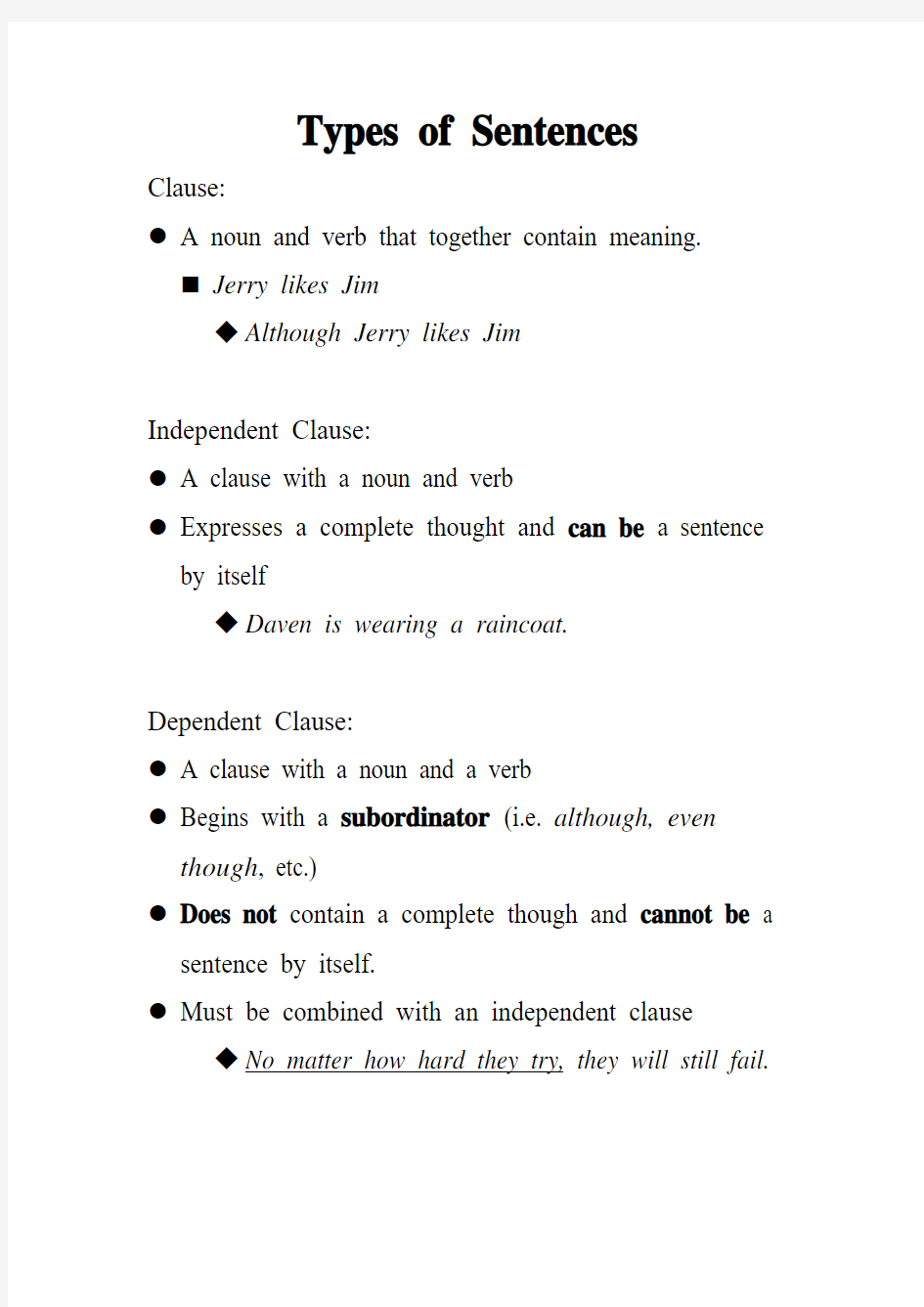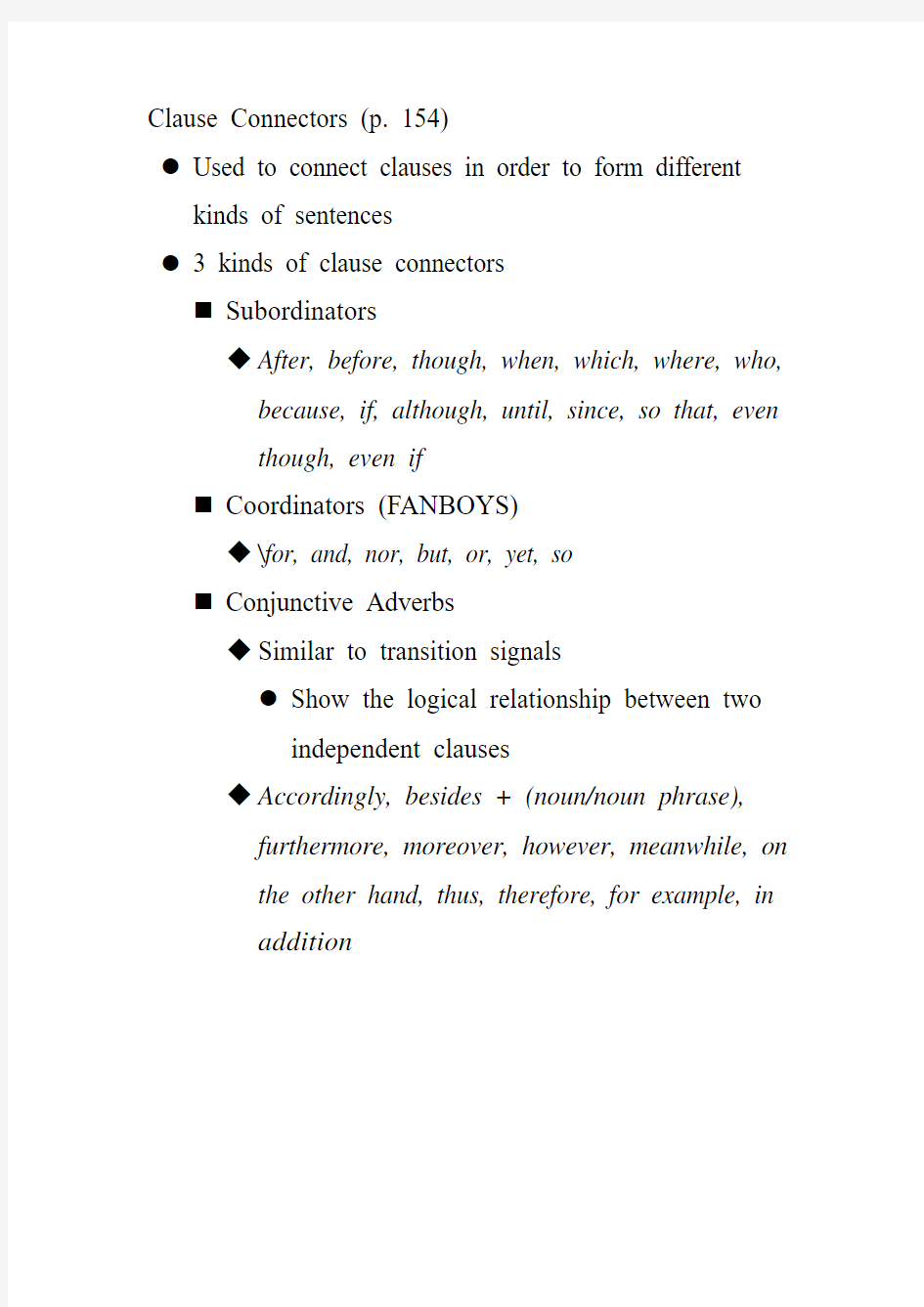Types of Sentences


Types of Sentences Clause:
●A noun and verb that together contain meaning.
?Jerry likes Jim
◆Although Jerry likes Jim
Independent Clause:
●A clause with a noun and verb
●Expresses a complete thought and can be a sentence
by itself
◆Daven is wearing a raincoat.
Dependent Clause:
●A clause with a noun and a verb
●Begins with a subordinator (i.e. although, even
though, etc.)
●Does not contain a complete though and cannot be a
sentence by itself.
●Must be combined with an independent clause
◆No matter how hard they try, they will still fail.
Clause Connectors (p. 154)
●Used to connect clauses in order to form different
kinds of sentences
●3 kinds of clause connectors
?Subordinators
◆After, before, though, when, which, where, who,
because, if, although, until, since, so that, even
though, even if
?Coordinators (FANBOYS)
◆\for, and, nor, but, or, yet, so
?Conjunctive Adverbs
◆Similar to transition signals
●Show the logical relationship between two
independent clauses
◆Accordingly, besides + (noun/noun phrase),
furthermore, moreover, however, meanwhile, on
the other hand, thus, therefore, for example, in
addition
Four Kinds of Sentences
1.Simple Sentence
●Only has one independent clause
●I enjoy playing basketball
●Can also have one subject and two verbs:
●I went to the store and bought some food.
●Can also have two subjects and one verb:
●Fred and I both are in Chelsea.
●Can also have two subjects and two verbs:
●Fred and I both go to Kaplan and want to go
to the UK.
https://www.360docs.net/doc/837883286.html,pound Sentence
●Contains at least two independent clauses
connected by either a coordinator, conjunctive
adverb, or a semicolon.
●3 ways to create compound sentences
https://www.360docs.net/doc/837883286.html,e a coordinator (FANBOYS)
●Put a comma (,) before the coordinator
a)I usually go to school by foot, but today I
went by bicycle.
https://www.360docs.net/doc/837883286.html,e a conjunctive adverb
●Put a semicolon (;) before the conjunctive
adverb and put a comma (,) after the
conjunctive adverb
a)I like Andy; however/on the other
hand/nevertheless/contrastingly; in
contrast/meanwhile, Andy hates me.
https://www.360docs.net/doc/837883286.html,e a semicolon
●Put a semicolon (;) between the two
independent clauses
a)I like Andy; Andy hates me.
b)Everyone is tired; we still have to have
class.
https://www.360docs.net/doc/837883286.html,plex Sentences
●Contains one independent clause
●Contains one or more dependent clauses
●The more important idea is placed in the
independent clause
●3 kinds of dependent clauses
1.Adverb Clause
●Placed at the beginning or the end of the
sentence
●Subordinators
a)Although, because, if, so that, even though,
while, since, when…
b)When the dependent is at the beginning of
the sentence, use a comma after the
dependent clause
i.Although everyone is tired, we still
have to have class.
c)When the dependent clause is at the end of
the sentence, don’t use a comma
i.We still have to have class although
everyone is tired.
2.Adjective Clause
●Describes the noun that comes immediately
before it.
●Subordinators: who, which, that, whose,
whom, what, where
●When the adjective clauses changes the
meaning of the sentence, don’t use a comma
a)Men who are not married are called
bachelors.
●When the adjective clause does not change
the meaning of the sentence, use a comma
a)Chengdu, which is located in
southwestern China, is a city known for
its spicy food.
3.Noun clauses
●Function as a noun
●Can be either the subject or the object of a
sentence
a)More commonly the object.
i.Research shows (it) that women live
longer than men.
ii.Adams (2012) stated (it) that
sustainability is important.
b)Can be the subject
i.What I will study in the UK (It) is an
important decision for me.
ii.Whether the girl will date me (It) is a big question.
https://www.360docs.net/doc/837883286.html,pound-Complex
